From June 17 - 27, the Bonn Climate Change Conference SB 50 took place. NewClimate Institute was present with multiple events, and released several related publications. Find all information about it here.
Events
Events with NewClimate Institute participation:
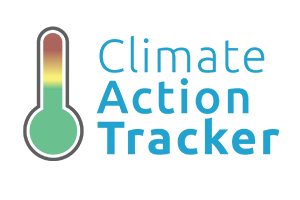 View webcast recordingPress Conference: Climate Action Tracker - presentation of the latest developments In this press conference, we presented the updated country assessments, and a briefing paper that summarises the most crucial developments. We also welcomed participants from outside of media, but please note that journalists got to ask questions first. Organiser: Climate Action Tracker (NewClimate Institute, Climate Analytics) Speakers: Niklas Höhne (NewClimate Institute), Bill Hare (Climate Analytics)Wednesday 19 June 11h00 - 11h30 Room Nairobi (Press room)
View webcast recordingPress Conference: Climate Action Tracker - presentation of the latest developments In this press conference, we presented the updated country assessments, and a briefing paper that summarises the most crucial developments. We also welcomed participants from outside of media, but please note that journalists got to ask questions first. Organiser: Climate Action Tracker (NewClimate Institute, Climate Analytics) Speakers: Niklas Höhne (NewClimate Institute), Bill Hare (Climate Analytics)Wednesday 19 June 11h00 - 11h30 Room Nairobi (Press room)
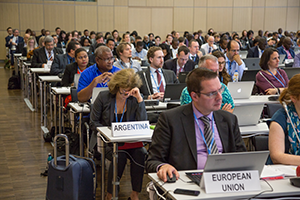 View webcast recordingSide event: Nationally driven ambition perspectives This side event examined the definitions and applications for NDC enhancement at country level discussing definitions and approaches towards mitigation ambition, resilience and adaptation, and support ambition in the light of equity. Organiser: CAN international, NewClimate Institute Speakers: Tasneem Essop (CAN international), Niklas Höhne (NewClimate Institute), Kakhaberi Mdivani (Georgian Ministry for Environmental Protection and Agriculture, Henrik Halgren Eriksen (Norwegian Ministry of Climate and Environment), Yevheniia Zasiadko (Friends of the Earth)Friday 21 June 15h00 - 16h30 Room Bonn
View webcast recordingSide event: Nationally driven ambition perspectives This side event examined the definitions and applications for NDC enhancement at country level discussing definitions and approaches towards mitigation ambition, resilience and adaptation, and support ambition in the light of equity. Organiser: CAN international, NewClimate Institute Speakers: Tasneem Essop (CAN international), Niklas Höhne (NewClimate Institute), Kakhaberi Mdivani (Georgian Ministry for Environmental Protection and Agriculture, Henrik Halgren Eriksen (Norwegian Ministry of Climate and Environment), Yevheniia Zasiadko (Friends of the Earth)Friday 21 June 15h00 - 16h30 Room Bonn
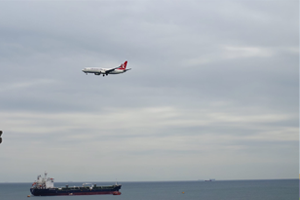 View webcast recordingSide event: GHG mitigation strategies in international aviation and maritime transport This side-event presented ongoing developments to regulate emissions from international aviation and shipping under ICAO and IMO, focussing on policies needed to align with the temperature goals of the Paris Agreement. Speakers presented important elements of pathways to decarbonise both sectors along with possible instruments required to deliver, including the Guidelines for avoiding double counting for CORSIA as well as impact assessments of vintage restrictions for offset units and slow steaming (more details on the event). Organiser: Institute for Applied Ecology e.V., European Federation for Transport and Environment Speakers: Aki Kachi (NewClimate Institute)Saturday 22 June 13h15 - 14h45 Room Bonn
View webcast recordingSide event: GHG mitigation strategies in international aviation and maritime transport This side-event presented ongoing developments to regulate emissions from international aviation and shipping under ICAO and IMO, focussing on policies needed to align with the temperature goals of the Paris Agreement. Speakers presented important elements of pathways to decarbonise both sectors along with possible instruments required to deliver, including the Guidelines for avoiding double counting for CORSIA as well as impact assessments of vintage restrictions for offset units and slow steaming (more details on the event). Organiser: Institute for Applied Ecology e.V., European Federation for Transport and Environment Speakers: Aki Kachi (NewClimate Institute)Saturday 22 June 13h15 - 14h45 Room Bonn
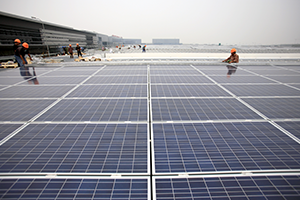 View webcast recordingSide event: Increasing NDCs in 2020 - analytical inputs This side event presented and discussed new and ongoing analysis on both effort-sharing under the Paris Agreement as well as updating NDCs based on lower renewable costs – and discussed them with practitioners involved in supporting relevant developments. Organiser: Ecologic Institute and Fraunhofer ISI Speakers: Guido Knoche (German Environment Agency), Jakob Wachsmuth (Fraunhofer ISI), Paola Parra (Climate Analytics), Leonardo Nascimento (NewClimate Institute)Monday 24 June 16h45 - 18h15 Room Bonn
View webcast recordingSide event: Increasing NDCs in 2020 - analytical inputs This side event presented and discussed new and ongoing analysis on both effort-sharing under the Paris Agreement as well as updating NDCs based on lower renewable costs – and discussed them with practitioners involved in supporting relevant developments. Organiser: Ecologic Institute and Fraunhofer ISI Speakers: Guido Knoche (German Environment Agency), Jakob Wachsmuth (Fraunhofer ISI), Paola Parra (Climate Analytics), Leonardo Nascimento (NewClimate Institute)Monday 24 June 16h45 - 18h15 Room Bonn
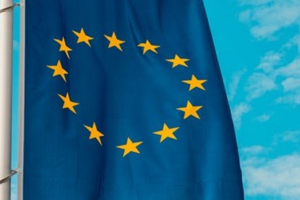 Side event: Spotlight on Europe: An Approach to Foster Sustainable Growth and Secure a Competitive Environment for Businesses This off-site side event discussed what the European Commission's long-term strategy's goal of a "prosperous, modern, competitive and climate-neutral economy by 2050" means for European businesses. It addressed the questions what this strategy means for companies, how sustainable growth can be fostered while securing the competitiveness of business, and what different perspectives on this European approach are. Organiser: ICC Germany, Deutsche Post DHL Group, Bundesverband der Deutschen Industrie e.V., econsense Speakers: Jill Meiburg (Deutsche Post DHL Group), Oliver Wieck (ICC Germany), Elina Bardram (European Commission), Björn Hannappel (Deutsche Post DHL Group), Dr. Brigitta Huckestein (BASF SE), Dr. Heinz-Gerd Peters (Deutsche Telekom AG), Dr. Hans-Jörn Weddige (thyssenkrupp AG), Thorsten Albig (Deutsche Post DHL Group), Volker Backs (Hydro Aluminium Rolled Products GmbH), Andrea Dreifke-Pieper (WWF DE), Frauke Röser (NewClimate Institute), Niclas Svenningsen (UNFCCC)Tuesday 25 June 10h30 - 13h00 Off-site event:
Side event: Spotlight on Europe: An Approach to Foster Sustainable Growth and Secure a Competitive Environment for Businesses This off-site side event discussed what the European Commission's long-term strategy's goal of a "prosperous, modern, competitive and climate-neutral economy by 2050" means for European businesses. It addressed the questions what this strategy means for companies, how sustainable growth can be fostered while securing the competitiveness of business, and what different perspectives on this European approach are. Organiser: ICC Germany, Deutsche Post DHL Group, Bundesverband der Deutschen Industrie e.V., econsense Speakers: Jill Meiburg (Deutsche Post DHL Group), Oliver Wieck (ICC Germany), Elina Bardram (European Commission), Björn Hannappel (Deutsche Post DHL Group), Dr. Brigitta Huckestein (BASF SE), Dr. Heinz-Gerd Peters (Deutsche Telekom AG), Dr. Hans-Jörn Weddige (thyssenkrupp AG), Thorsten Albig (Deutsche Post DHL Group), Volker Backs (Hydro Aluminium Rolled Products GmbH), Andrea Dreifke-Pieper (WWF DE), Frauke Röser (NewClimate Institute), Niclas Svenningsen (UNFCCC)Tuesday 25 June 10h30 - 13h00 Off-site event:
Post Tower
Platz der Deutschen Post
53113 BonnRelated Publications
NewClimate-publications related to Bonn SB50:
Find all NewClimate's publications here
Carbon market mechanisms:
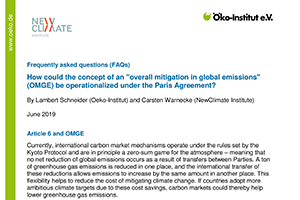 How could the concept of an “overall mitigation in global emissions” (OMGE) be operationalized under the Paris Agreement? (Frequently asked questions) This paper addresses questions that have been raised in relation to OMGE. It draws on a study conducted by Lambert Schneider and NewClimate Institute. To the blogpost
How could the concept of an “overall mitigation in global emissions” (OMGE) be operationalized under the Paris Agreement? (Frequently asked questions) This paper addresses questions that have been raised in relation to OMGE. It draws on a study conducted by Lambert Schneider and NewClimate Institute. To the blogpost
 Serious issues in the negotiations on international carbon markets (Article 6) must be addressed to avoid undermining the Paris Agreement In this blogpost, the NewClimate markets team provides recommendations for the imminent SB50 negotiations to guarantee that Article 6 ensures its mandate to promote ambition and avoid undermining global climate efforts. To the blogpost
Serious issues in the negotiations on international carbon markets (Article 6) must be addressed to avoid undermining the Paris Agreement In this blogpost, the NewClimate markets team provides recommendations for the imminent SB50 negotiations to guarantee that Article 6 ensures its mandate to promote ambition and avoid undermining global climate efforts. To the blogpost
 Ein Preis auf CO2 – essenziell, aber allein nicht ausreichend Klimawandel ist eines der größten Probleme unserer Zeit. Ein Preis auf CO2-Emissionen ist aus ökonomischer Sicht ein adäquates Mittel, die Verursacher zur Verantwortung zu ziehen und effizient den Ausstoß von Treibhausgasen dort zu reduzieren, wo es am günstigsten ist. Aber um die Wende in eine treibhausgasfreie Zukunft zu bewältigen, sind zusätzliche politische Maßnahmen nötig. To the blogpost
Ein Preis auf CO2 – essenziell, aber allein nicht ausreichend Klimawandel ist eines der größten Probleme unserer Zeit. Ein Preis auf CO2-Emissionen ist aus ökonomischer Sicht ein adäquates Mittel, die Verursacher zur Verantwortung zu ziehen und effizient den Ausstoß von Treibhausgasen dort zu reduzieren, wo es am günstigsten ist. Aber um die Wende in eine treibhausgasfreie Zukunft zu bewältigen, sind zusätzliche politische Maßnahmen nötig. To the blogpost
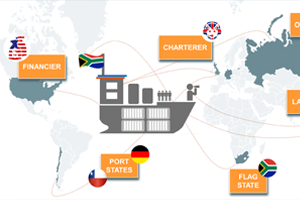 Setting a course for decarbonised shipping: An Eight Point Carbon Pricing Plan To achieve the temperature goals of the Paris Agreement, global emissions – including shipping – must peak as soon as possible and decline rapidly, reaching net-zero by around 2050. To help bring this about, this blog presents eight steps to guide the implementation of a levy for international shipping. To the blogpost
Setting a course for decarbonised shipping: An Eight Point Carbon Pricing Plan To achieve the temperature goals of the Paris Agreement, global emissions – including shipping – must peak as soon as possible and decline rapidly, reaching net-zero by around 2050. To help bring this about, this blog presents eight steps to guide the implementation of a levy for international shipping. To the blogpost
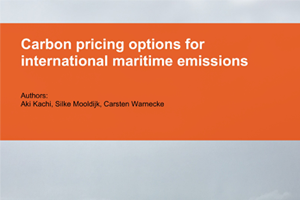 Carbon pricing options for international maritime emissions In this paper we explore three different options for a market-based measure to address the climate impact of shipping: an offsetting scheme, a maritime emissions trading scheme, and a climate levy. We conclude that a climate levy would be the most appropriate measure to reduce emissions in the maritime sector. To the publication
Carbon pricing options for international maritime emissions In this paper we explore three different options for a market-based measure to address the climate impact of shipping: an offsetting scheme, a maritime emissions trading scheme, and a climate levy. We conclude that a climate levy would be the most appropriate measure to reduce emissions in the maritime sector. To the publication
 Robust eligibility restrictions for offset credits are needed for CORSIA to truly compensate for the growth in aviations carbon emissions If airlines are allowed to use all available offset credits certified by programmes such as the UN’s Clean Development Mechanism and other voluntary standard bodies under a new global scheme to address international aviation emissions, the scheme will not truly compensate the sector’s growing CO2 emissions. To achieve the aviation scheme’s objective of carbon neutral growth, policy-makers must adopt robust criteria on the types of offset credits that are accepted. The rules should be designed to ensure that the scheme supports the development of new emission reduction projects or targets existing projects that would stop reducing emissions without further financial support. New research outlines the climate implications of various eligibility scenarios for offset credits. To the blogpost
Robust eligibility restrictions for offset credits are needed for CORSIA to truly compensate for the growth in aviations carbon emissions If airlines are allowed to use all available offset credits certified by programmes such as the UN’s Clean Development Mechanism and other voluntary standard bodies under a new global scheme to address international aviation emissions, the scheme will not truly compensate the sector’s growing CO2 emissions. To achieve the aviation scheme’s objective of carbon neutral growth, policy-makers must adopt robust criteria on the types of offset credits that are accepted. The rules should be designed to ensure that the scheme supports the development of new emission reduction projects or targets existing projects that would stop reducing emissions without further financial support. New research outlines the climate implications of various eligibility scenarios for offset credits. To the blogpost
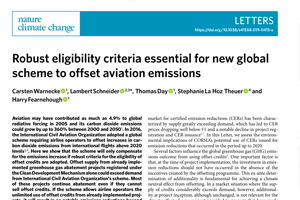 Robust eligibility criteria essential for new global scheme to offset aviation emissions This letter in Nature Climate Change finds that CORSIA will only compensate for the emissions increase of international aviation if robust criteria for the eligibility of offset credits are adopted. To the paper
Robust eligibility criteria essential for new global scheme to offset aviation emissions This letter in Nature Climate Change finds that CORSIA will only compensate for the emissions increase of international aviation if robust criteria for the eligibility of offset credits are adopted. To the paper
 Operationalising an ‘overall mitigation in global emissions’ under Article 6 of the Paris Agreement A key requirement of the mechanism established by Article 6.4 of the Paris Agreement is that it shall aim to deliver an overall mitigation in global emissions. This report identifies and discusses key options for operationalising this concept, leading to distinct recommendations to support the ongoing. To the report
Operationalising an ‘overall mitigation in global emissions’ under Article 6 of the Paris Agreement A key requirement of the mechanism established by Article 6.4 of the Paris Agreement is that it shall aim to deliver an overall mitigation in global emissions. This report identifies and discusses key options for operationalising this concept, leading to distinct recommendations to support the ongoing. To the report
NDCs and ambition raising:
 Saving time and resources by aligning climate planning processes This blogpost shows how countries could consolidate multiple climate change planning processes and international climate commitments into one single process, ensuring efficiency and alignment. To the blogpost
Saving time and resources by aligning climate planning processes This blogpost shows how countries could consolidate multiple climate change planning processes and international climate commitments into one single process, ensuring efficiency and alignment. To the blogpost
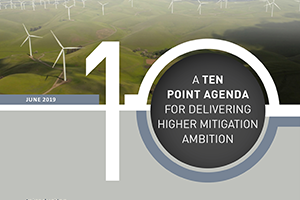 A ten point agenda for delivering higher mitigation ambition The paper formulates 10 points for mitigation ambition and includes recommendations on ways to support ambition raising through international cooperation. To the report
A ten point agenda for delivering higher mitigation ambition The paper formulates 10 points for mitigation ambition and includes recommendations on ways to support ambition raising through international cooperation. To the report
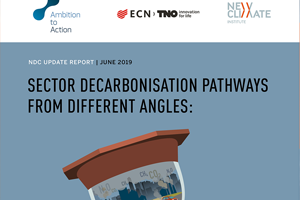 Sector decarbonisation pathways from different angles: technology, modelling, politics In this mid-year edition of the NDC Update Report, we focus on sector decarbonisation pathways. We discuss what it takes to think through the choices involved in shaping a Paris-compatible sector future from a number of different perspectives. To the report
Sector decarbonisation pathways from different angles: technology, modelling, politics In this mid-year edition of the NDC Update Report, we focus on sector decarbonisation pathways. We discuss what it takes to think through the choices involved in shaping a Paris-compatible sector future from a number of different perspectives. To the report
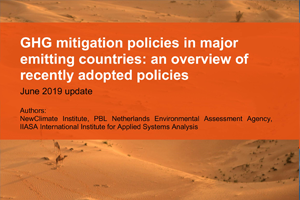 GHG mitigation policies in major emitting countries: an overview of recently adopted policies This document presents an overview of climate and energy policies mostly adopted between July 2018 and May 2019 in 25 countries and regions. The policy information compiled by NewClimate Institute, PBL and IIASA in this document supplements the December 2018 report on the projected greenhouse gas (GHG) emissions under currently implemented policies and mitigation commitments (Kuramochi et al., 2018). To the report
GHG mitigation policies in major emitting countries: an overview of recently adopted policies This document presents an overview of climate and energy policies mostly adopted between July 2018 and May 2019 in 25 countries and regions. The policy information compiled by NewClimate Institute, PBL and IIASA in this document supplements the December 2018 report on the projected greenhouse gas (GHG) emissions under currently implemented policies and mitigation commitments (Kuramochi et al., 2018). To the report
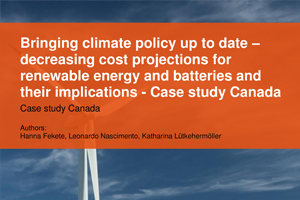 Bringing climate policy up to date – decreasing cost projections for renewable energy and batteries and their implications (case study Canada) This case study presents the potential impact of lower battery and renewable energy costs projections in Canada's NDC emissions reductions target. To the report
Bringing climate policy up to date – decreasing cost projections for renewable energy and batteries and their implications (case study Canada) This case study presents the potential impact of lower battery and renewable energy costs projections in Canada's NDC emissions reductions target. To the report
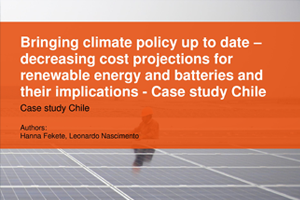 Bringing climate policy up to date – decreasing cost projections for renewable energy and batteries and their implications (case study Chile) This case study presents the potential impact of lower battery and renewable energy costs projections in Chile's NDC emissions reductions target. To the report
Bringing climate policy up to date – decreasing cost projections for renewable energy and batteries and their implications (case study Chile) This case study presents the potential impact of lower battery and renewable energy costs projections in Chile's NDC emissions reductions target. To the report
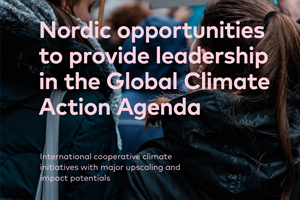 Nordic opportunities to provide leadership in the Global Climate Action Agenda This paper evaluates the current and potential future involvement of Nordic countries in initiatives under the Global Climate Action Agenda. To the report
Nordic opportunities to provide leadership in the Global Climate Action Agenda This paper evaluates the current and potential future involvement of Nordic countries in initiatives under the Global Climate Action Agenda. To the report
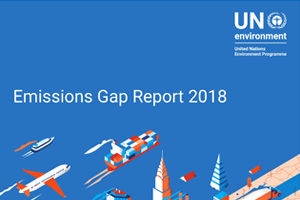 The Emissions Gap Report 2018: A UN Environment Synthesis Report This is the 9th edition of the UN Environment Emissions Gap Report. It assesses the latest scientific studies on current and estimated future greenhouse gas emissions and compares these with the emission levels permissible for the world to progress on a least-cost pathway to achieve the goals of the Paris Agreement. To the report
The Emissions Gap Report 2018: A UN Environment Synthesis Report This is the 9th edition of the UN Environment Emissions Gap Report. It assesses the latest scientific studies on current and estimated future greenhouse gas emissions and compares these with the emission levels permissible for the world to progress on a least-cost pathway to achieve the goals of the Paris Agreement. To the report
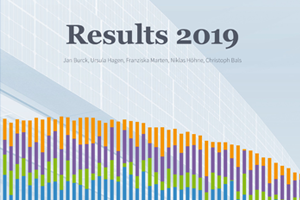 The Climate Change Performance Index 2019 Developed by NewClimate Institute, Germanwatch and CAN, the index ties in with the global Climate Change Performance Index by Germanwatch, a rating of the 58 largest emitters of GHG emissions globally that has been published annually since 2006. To the report
The Climate Change Performance Index 2019 Developed by NewClimate Institute, Germanwatch and CAN, the index ties in with the global Climate Change Performance Index by Germanwatch, a rating of the 58 largest emitters of GHG emissions globally that has been published annually since 2006. To the report






